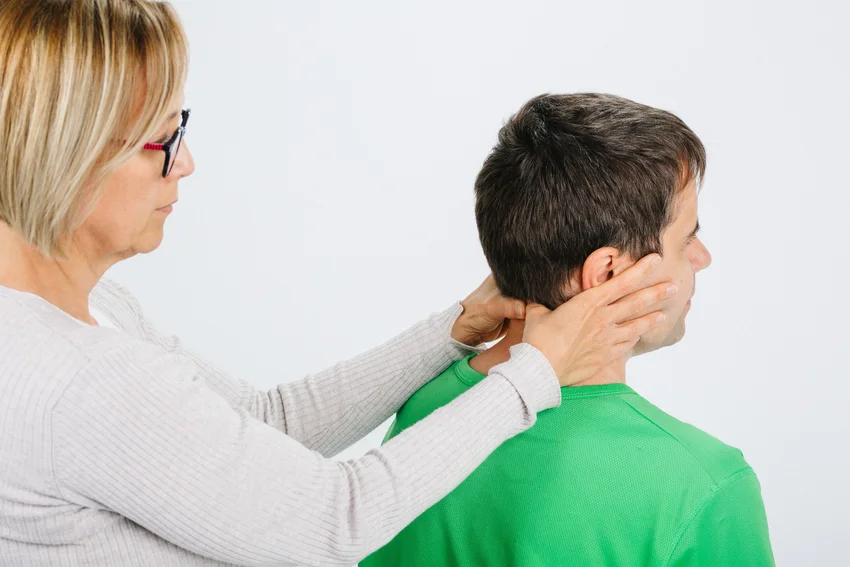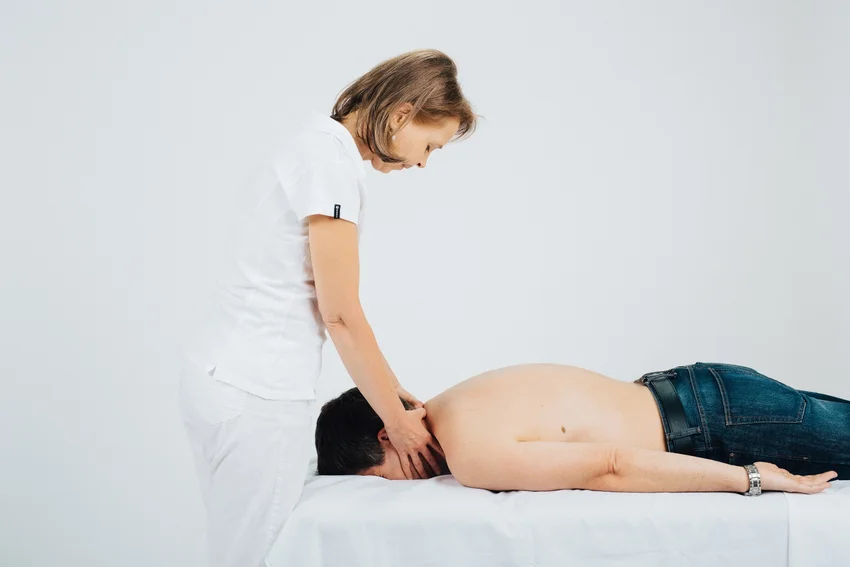This is how our application simplifies the booking and administration process. Interested >>
Physiotherapy methods
Our qualified physiotherapists are able to lead patients from the early sessions to even doing sports, always adapting the therapy to the actual condition of the patients.
The most frequently applied physiotherapy methods at our Institute are the following:
1. Manual therapy
Manual therapy (Maitland, Mulligan, Barvicsenko, Nordic Approach OMT) is a special field in the system of treatments in physiotherapy. This method is one of the hands-on techniques in physiotherapy. The therapists using their own mechanical energies when applying different manual techniques treat soft tissues (muscle, tendon, ligament, cartilage), joints and peripheral nerves. With this method, range of motion can be improved, pain and inflammation of soft tissues can be reduced, tissues can loosen up, and movement function can be enhanced.

2. Segmental stabilization training
Segmental stabilization training aims to activate the stabilizing function of the muscles around the spine (deep and superficial), as well as around the shoulder and hip joints. It also aims to improve endurance, reduce pain and protect joints from overuse and micro injuries.
3. Functional training
Functional training is a sum of exercises that works the body in a complex way using movement chains. (As opposed to working in isolated movement patterns.) This approach, therefore, improves the functional capacity of the spine both when doing daily activities and practising sports as well.
4. McKenzie method
McKenzie method is a mechanical diagnosis and therapy. Patients learn exercises based on the physiotherapy assessment, and become able to alleviate their symptoms at home on their own, thus reducing their risk of having flare-ups.
5. Schroth method
Schroth method is an internationally recognized method, and one of the most effective physiotherapy program in treating scoliosis. Therapists apply three dimensional active correction in asymmetric starting positions, along with a special breathing technique and stretching. With the regular practice of exercises tailored for the individual, spinal functions and breathing mechanisms may improve, the restoration of muscle balance and the correction of curves may be expected.
6. Paediatric physiotherapy
Paediatric physiotherapy is an exercise program, in which the exercises improving the condition are adapted to the child’s individual needs, abilities and age in a playful, enjoyable way and in a happy environment. Poor posture, other postural dysfunctions, scoliosis and static foot disorders are treated at our Institute.
7. Complex treatment of large joints
Complex treatment of large joints includes passive or assisted active mobilisation, which reduces painful muscle spasm, increases joint range of motion, restores muscle balance and reduces the overloading of joints.
8. Peripheral nerve mobilisation
Peripheral nerve mobilisation is one of the methods in physiotherapy that effectively reduces peripheral nerve compression induced neural pain and the consequent muscle spasm.

9. Pilates
Pilates is an exercise program with a holistic approach, applying active stretching and strengthening in order to set or restore the whole body to balance. The elongated and strengthened muscles improve posture, overall fitness, break down dysfunctional movement patterns and ensure optimal body function.
10. PNF method
PNF method aims to promote activation of muscles damaged in function, using passive stretching and giving stimuli to the body’s receptors that are responsible for proprioception. These prepared muscles are then made to work actively in diagonals in accordance with special movement patterns. This method improves muscle elasticity, and has a positive impact on the active movement system, muscle tone and muscle strength.
11. Kinesio taping
Kinesio taping is a therapeutic taping technique, which promotes lymphatic drainage by lifting the tissue layers under the skin, and alleviates pain by having a positive effect on pain receptors located in the area. Tape does not contain any active substances, it is made of cotton, it is also skin friendly and hypoallergenic.
12. Back school for a correct posture
During these sessions a huge variety of physiotherapy methods, techniques and exercise programs can be applied. It restores muscle balance, promotes functional loading for joints and for the physiological curves of the spine, enables the trunk muscles to work effectively and creates an aesthetic appearance.
13. Antenatal exercise program
Antenatal exercise program at our Institute is recommended to women suffering from spinal problems during their pregnancy. It completes traditional antenatal fitness classes with special strengthening exercises for the muscles stabilizing the spine. These special strengthening exercises help to alleviate backache arising from the gradual increase of bodyweight, they also help to reduce and prevent pain due to overloaded muscles, and they contribute to keeping the optimal position of the line of gravity, which may alter due to the shift of the centre of gravity.
Feel free to contact our specialists!
At the Buda Health Center, you have the opportunity to attend the private practices of more than 300 renowned specialists, offering expertise in nearly 45 medical specialisms, at five locations. Personalized care is provided by a well-trained and empathetic staff of professionals, who have been working together for a long time. Based on our 24 years of experience and the feedback received from our 450,000 clients, we are constantly working to organize our healthcare services in the most efficient way possible for those who visit us, paying respect to their needs and time.
Book an appointment on weekdays between 08:00 and 20:00 on +36 1 489-5200!
